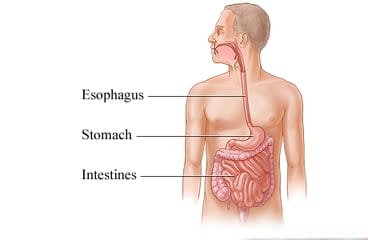What is it?

An upper gastrointestinal (GI) series looks at the upper and middle sections of the gastrointestinal tract. The test uses barium contrast material, fluoroscopy, and X-ray. Fluoroscopy is a kind of X-ray.
Why is this test done?
An upper GI series is done to find the cause of symptoms such as vomiting, burping up food, trouble swallowing, poor weight gain, bleeding, or belly pain. It's used to find narrow spots or blockages in the upper intestinal tract. The test can also find ulcers, polyps, and pyloric stenosis.
How do you prepare for the test?
You may have to eat a low-fiber diet for a few days before the test, stop eating for several hours before the test, or both. You may also need to take a laxative to help clean out your intestines the evening before the test and stop taking certain medicines.
How is the test done?
- You will need to take off your clothes and put on a hospital gown.
- Take out any dentures, and take off any jewelry.
- You will lie on your back on an X-ray table.
- You will have an X-ray taken before you drink the barium mix. Then you'll take small swallows repeatedly during the series of X-rays that follow.
- The doctor watches the barium pass through your GI tract using fluoroscopy and X-ray pictures. The table is tilted at different positions, and you may change positions to help spread the barium.
- You may be given a laxative or enema to flush the barium out of your intestines after the test to prevent constipation.
How long does the test take?
The test will take less than an hour. If you are also having a small bowel study, the test may take 2 to 6 hours.
What happens after the test?
- You will probably be able to go home right away. Results of the test are usually ready in 1 to 3 days.
- You can go back to your usual activities right away. You may eat and drink whatever you like, unless your doctor tells you not to. It's a good idea to drink a lot of fluids for a few days to flush out the barium.
- For 1 to 3 days after the test, your stool (feces) will look white from the barium.
- If the barium stays in your intestine, it can harden and cause a blockage. If you get constipated, you may need to use a laxative to pass a stool.
- In some cases, you may be asked to come back after 24 hours to have more X-rays taken.
When should you call for help?
Call your doctor
Call your doctor now or seek immediate medical care if:
- You have severe belly pain.
- You have a fever.
Watch closely for changes in your health, and be sure to contact your doctor if:
- You can't pass gas.
- You aren't able to have a bowel movement in 2 to 3 days after the test.
Follow-up care is a key part of your treatment and safety. Be sure to make and go to all appointments, and call your doctor if you are having problems. It's also a good idea to keep a list of the medicines you take. Ask your doctor when you can expect to have your test results.
Where can you learn more?
Go to http://www.healthwise.net/patientEd
Enter J416 in the search box to learn more about "Upper GI Series: About This Test".
Current as of: March 26, 2025
Author: Ignite Healthwise, LLC Staff
Clinical Review Board
All Ignite Healthwise, LLC education is reviewed by a team that includes physicians, nurses, advanced practitioners, registered dieticians, and other healthcare professionals.

